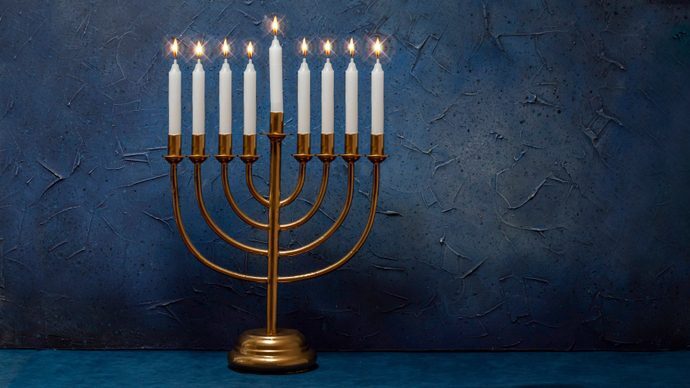
On the evening of Thursday, December 7th, President Emmanuel Macron lit the first Hanukkah candle at the Élysée Palace, prompting widespread disapproval of a gesture seen as a breach of the secularism normally expected from the French head of state.
The gesture, made in the company of the chief rabbi of France, Haim Korsia, took place on the sidelines of the presentation to President Macron of the Lord Jacobovits Prize, awarded to European statesmen who fight antisemitism. For the Élysée, the ‘context’ of this evening is important, to understand that it was “in no way” a celebration of the Jewish holiday by the president.
Controversy soon erupted in France, on both the Left and the Right. The main accusation levelled at Emmanuel Macron is that he is undermining the principle of secularism, which, since the 1905 law separating church and state, means that the state neither recognises nor subsidises any religion. The head of state must therefore display total neutrality with regard to all religions, whatever they may be. This principle has hardened over time: while nothing prevented General de Gaulle from singing the Te Deum at Notre Dame, the slightest sign of religious commitment is now held against the president, as when he was criticised for having blessed the remains of the singer Johnny Hallyday in the Madeleine church in 2017.
David Lisnard, president of the Association of Mayors of France, a member of the Les Républicains party, and a possible right-wing candidate for the 2027 presidential election, condemned Macron’s gesture, a “first” that he deemed “contrary to secularism.”
Beyond the lighting of the candle, it is the president’s inconsistency that is being denounced, since he refused to take part in the great march against antisemitism organised on Sunday, November 12th, at the initiative of the presidents of the National Assembly and the Senate. Hence the criticism from Laurent Jacobelli, spokesman for the Rassemblement National (RN), who said he understood “that it may come as a surprise that the President of the Republic is celebrating a religious ceremony in the heart of the Élysée Palace.” In his view, the explanation lies in the president’s remorse for not having taken part in the march on November 12th: “Perhaps Emmanuel Macron wants to counteract the troubled image he may have given to our Jewish compatriots by not taking part in the march,” added the RN MP.
On the Left, Emmanuel Macron is accused of trampling on the principle of secularism, to which left-wing parties are traditionally very attached. “This evening, the Élysée Palace has become a place of worship. And on Sunday morning, mass in Latin? Laïcité, quand tu nous tiens!” declared La France Insoumise Deputy Adrien Quatennens on X.
Ce soir, le Palais de l’Elysée est devenu un lieu de culte.
— Adrien Quatennens (@AQuatennens) December 7, 2023
Et dimanche matin, la messe en latin ?
Laïcité, quand tu nous tiens ! pic.twitter.com/nRvMrugoqM
The socialists share the right-wing view that the president’s choices are incomprehensible. “The Republic was waiting for him to demonstrate against anti-Semitism, but he wasn’t there. The secular Republic did not expect him to attend a religious feast at the Élysée Palace,” criticised former socialist senator David Assouline.
The Left also fears that Macron’s gesture runs the risk of aggravating dissension between communities by sending a signal of favouritism to the Jewish community, which would be badly perceived by France’s Muslims. The news coincides with the publication of a survey published on the occasion of Secularism Day—the same December 7th—which reveals that 78% of Muslims in France feel that secularism in France discriminates against Muslims.
More broadly, some French people are concerned about the risk of one-upmanship that could arise after this ceremony. How are we to prevent the irruption of Eid at the presidential residence if it occurs in the years to come?
J’ai une question pour @ZemmourEric @ECiotti @MLP_officiel : si le président décide de célébrer le lancement de l Aïd el Kebir à l’Élysée : vous serez évidemment d’accord . Et @LDH_Fr si demain le président décide de célébrer les vêpres du troisième dimanche de l’avent à… https://t.co/wR2LvtwtML
— Fabrice Di Vizio (@DIVIZIO1) December 7, 2023
But what is most unexpected is that many voices have come from the Jewish community itself to condemn Emmanuel Macron’s initiative. Yonathan Arfi, president of Crif (the Representative Council of Jewish Institutions in France), said it was “a mistake” to celebrate the start of the Jewish festival of Hanukkah at the Elysée Palace on Thursday evening, in the presence of Emmanuel Macron. A Parisian rabbi described the episode as “scandalous.”
Elsewhere in Europe, the lighting of candles for Hanukkah does not seem to raise such a storm. Wearing a kippah, German Chancellor Olaf Scholz lit the first candle on a ten-metre-high candelabra at the Brandenburg Gate in Berlin on Thursday evening, December 7th—his way of saying that Germany’s Jewish community should not feel besieged here because of events in Palestine. The German police have recorded a 300% increase in anti-Semitic acts since the attack on October 7th.
